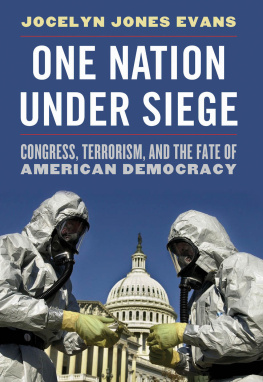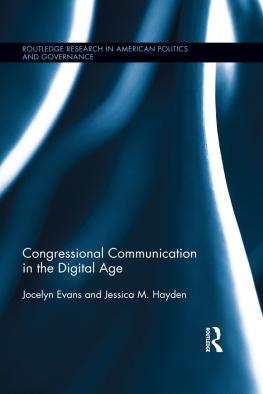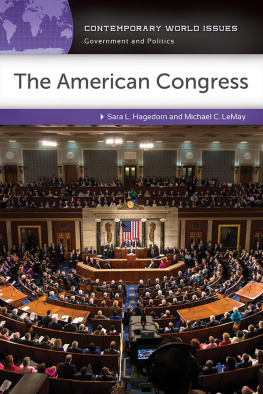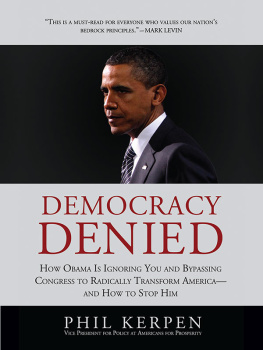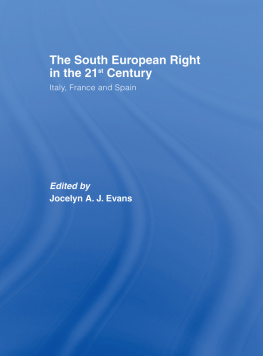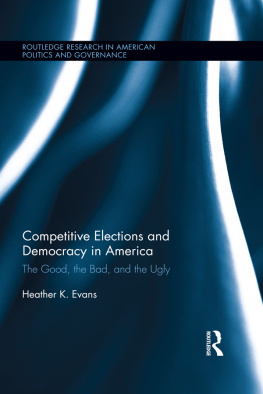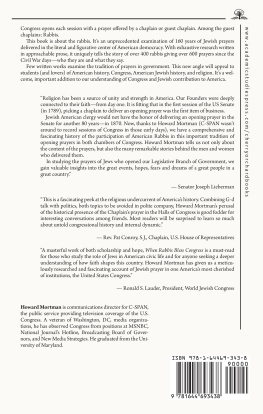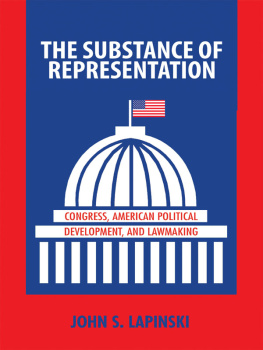Jocelyn Evans - One Nation Under Siege: Congress, Terrorism, and the Fate of American Democracy
Here you can read online Jocelyn Evans - One Nation Under Siege: Congress, Terrorism, and the Fate of American Democracy full text of the book (entire story) in english for free. Download pdf and epub, get meaning, cover and reviews about this ebook. year: 2010, publisher: University Press of Kentucky, genre: Politics. Description of the work, (preface) as well as reviews are available. Best literature library LitArk.com created for fans of good reading and offers a wide selection of genres:
Romance novel
Science fiction
Adventure
Detective
Science
History
Home and family
Prose
Art
Politics
Computer
Non-fiction
Religion
Business
Children
Humor
Choose a favorite category and find really read worthwhile books. Enjoy immersion in the world of imagination, feel the emotions of the characters or learn something new for yourself, make an fascinating discovery.
- Book:One Nation Under Siege: Congress, Terrorism, and the Fate of American Democracy
- Author:
- Publisher:University Press of Kentucky
- Genre:
- Year:2010
- Rating:3 / 5
- Favourites:Add to favourites
- Your mark:
- 60
- 1
- 2
- 3
- 4
- 5
One Nation Under Siege: Congress, Terrorism, and the Fate of American Democracy: summary, description and annotation
We offer to read an annotation, description, summary or preface (depends on what the author of the book "One Nation Under Siege: Congress, Terrorism, and the Fate of American Democracy" wrote himself). If you haven't found the necessary information about the book — write in the comments, we will try to find it.
Jocelyn Evans: author's other books
Who wrote One Nation Under Siege: Congress, Terrorism, and the Fate of American Democracy? Find out the surname, the name of the author of the book and a list of all author's works by series.
One Nation Under Siege: Congress, Terrorism, and the Fate of American Democracy — read online for free the complete book (whole text) full work
Below is the text of the book, divided by pages. System saving the place of the last page read, allows you to conveniently read the book "One Nation Under Siege: Congress, Terrorism, and the Fate of American Democracy" online for free, without having to search again every time where you left off. Put a bookmark, and you can go to the page where you finished reading at any time.
Font size:
Interval:
Bookmark:
UNDER SIEGE
Fate of American Democracy
serving Bellarmine University, Berea College, Centre
College of Kentucky, Eastern Kentucky University,
The Filson Historical Society, Georgetown College,
Kentucky Historical Society, Kentucky State University,
Morehead State University, Murray State University,
Northern Kentucky University, Transylvania University,
University of Kentucky, University of Louisville,
and Western Kentucky University.
All rights reserved.
663 South Limestone Street, Lexington, Kentucky 40508-4008
www.kentuckypress.com
One nation under siege : Congress, terrorism, and the fate of American
democracy / Jocelyn Jones Evans.
p. cm.
Includes bibliographical references and index.
ISBN 978-0-8131-2588-6 (hardcover : alk. paper)
1. United States. Congress. 2. United States. CongressSecurity
measures. 3. United States. CongressConstituent communication.
4. United States Capitol (Washington, D.C.Security measures. 5. United
States Capitol Visitor Center (Washington, D.C.) 6. Civil rightUnited
States. 7. National securityUnited States. I. Title.
JK1021.J63 2010
328.73dc22
2010006312
the requirements of the American National Standard
for Permanence in Paper for Printed Library Materials.

Manufactured in the United States of America.

American University Presses
Washington, D.C.
Electoral Safety and Year of Entry
Electoral Safety
Both Electoral Safety and Entry
Program Funds across Selected States: FY2003FY2006
Urban Centers: FY2003FY2006
from Governmental Affairs to Homeland Security and
Governmental Affairs: 108th Congress111th Congress
Security
Committee Jurisdiction

Font size:
Interval:
Bookmark:
Similar books «One Nation Under Siege: Congress, Terrorism, and the Fate of American Democracy»
Look at similar books to One Nation Under Siege: Congress, Terrorism, and the Fate of American Democracy. We have selected literature similar in name and meaning in the hope of providing readers with more options to find new, interesting, not yet read works.
Discussion, reviews of the book One Nation Under Siege: Congress, Terrorism, and the Fate of American Democracy and just readers' own opinions. Leave your comments, write what you think about the work, its meaning or the main characters. Specify what exactly you liked and what you didn't like, and why you think so.

